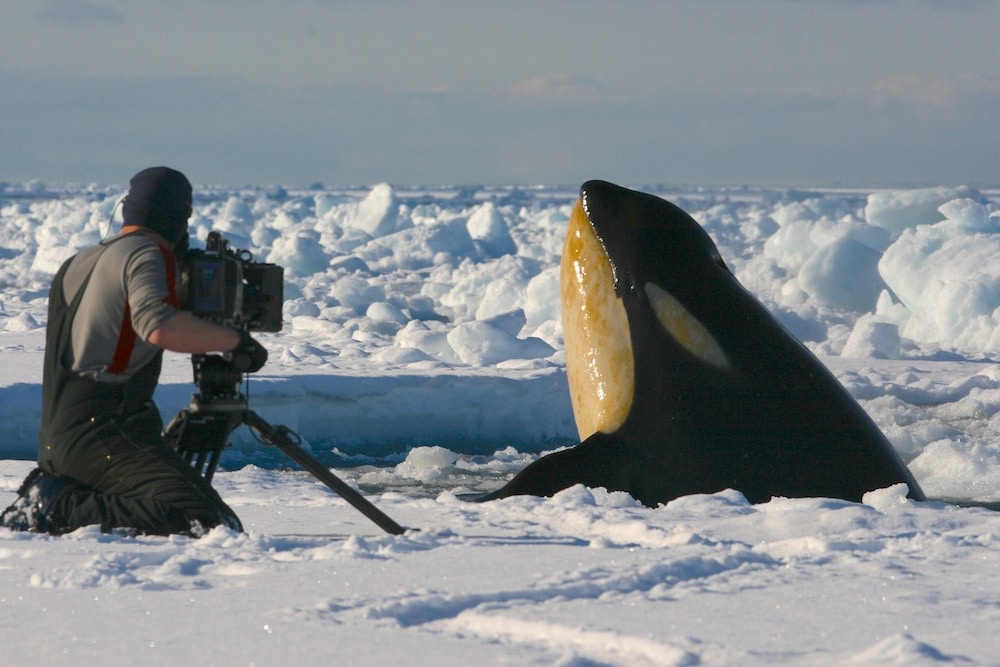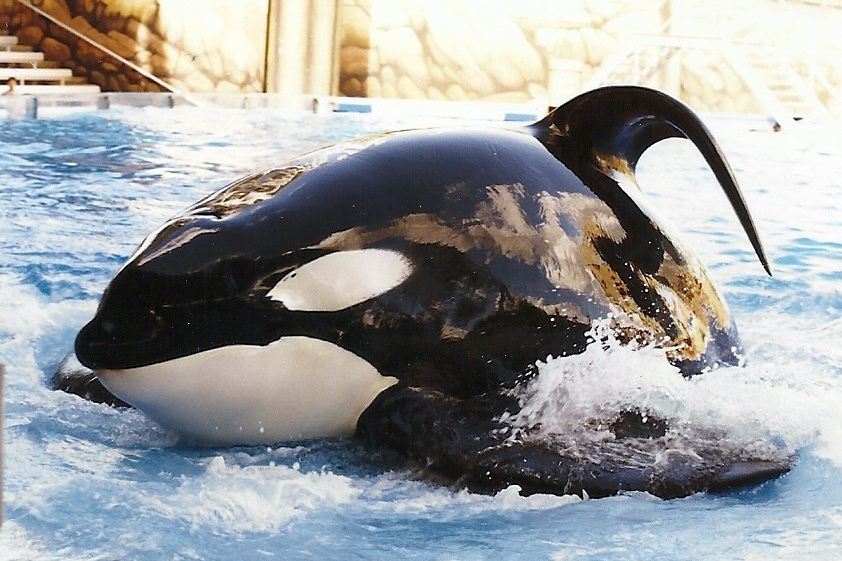A myriad of confronting environmental issues have been presented throughout many environmental documentaries in the late 20th century, including Sir David Attenborough’s ‘Blue Planet’ (2001) and ‘Black Fish’ (2013). However, with the presentation of these major environmental issues, it is important to critique the success of documentaries concerning igniting public discussion and creating the need for collective change.
Documentary films are powerful tools that provide in-depth research and information in a captivating way that can trigger discussion and even spark social movements. Due to the power documentaries have in creating conversation, I have decided to investigate how environmental documentaries are potentially changing social, political and cultural beliefs of their respective audiences regarding ‘Blue Planet’ and ‘Black Fish’.

Orca Trainer at Sea World San Diego
Documentaries target the pre-existing beliefs and ideals of their respective audiences while providing entertainment, through the use of two core conventions. Firstly, the human element of environmental documentaries, including camera crews, expensive technology, housing and farms are exempt from filming. This is done to create an idealistic view of the ‘natural world’, showcasing only the environment and the factors affecting that particular environment. Subsequently, by employing this convention, documentaries are only providing a highly edited, staged version of reality but are also further enhancing their ability to persuade their audiences.

Behind the scenes of ‘Blue Planet II’, illustrating the removed human factor
They can do this by showcasing the ‘untouched’ beauty of the environment and contrast that to the humanized world that is diminishing/harming the natural environment triggering a desire to change in audiences. In the 2001 documentary, ‘Blue Planet’, Sir David Attenborough heavily uses this convention to draw attention from our humanized world to focus on the environmental world and the detrimental factors currently effecting specific environments. An example of this, which I will discuss in my research project, is prevalent through the discussion of the film of the irreversible damages caused by plastic pollution across many environments however especially in our oceans.

Blue Planet Poster (2001)
Secondly, documentaries usually follow a traditional narrative structure, meaning that throughout the environmental documentary there is usually a coming of age story, a quest for a mate or the need to find food. This style is traditionally incorporating to influence audience members, as audiences can relate the experiences showcased in the documentary and connect with animals depicted on screen. In addition to this structure, directors often anthropomorphise, provide animals with human emotions and characteristics, animals that appear on the screen. Anthropomorphism is a useful tool to emote empathy in responders, as audiences can relate their past experiences of heartbreak, loss of a loved one or belonging, the feeling of isolation/ being trapped, fear and sadness. In the 2007 documentary, ‘Black Fish’, director Gabriela Cowperthwaite employs the convention of a traditional narrative structure and anthropomorphism to evoke a sympathetic response from audiences regarding the heartbreaking story of Tillikum and other Orca’s held in captivity across the world.

‘Corky’, an Orca in captivity in Sea World San Diego, anthropomorphized to be sad due to the collapsed dorsal fin.
Due to the opinion lead nature of documentaries, for example, that global warming occurs or that it does not, and the ‘fictional’ nature that is depicted in environmental documentaries, it is imperative to investigate how documentaries can change or challenge the beliefs and ideals of their respective audiences. For my research project, I will be investigating the nature of influence documentaries have in influencing public opinion with social, cultural and political beliefs. To assess the success of documentaries in challenging social views, I will critique a variety of articles specifically focusing on ‘Nature documentaries and saving nature: Reflections on Blue Planet’ (J, Jones 2019) and ‘The Black Fish Effect and Corporate Change’ (E, Parsons 2018) while subsequently evaluating the political changes that both ‘Blue Planet’ and ‘Black Fish’ achieved, for example, the Queen’s ban on single-use plastic and Sea World losing millions in revenue across all of its parks in America.

Tillikum the Orca, Sea World
As environmental documentaries have a large audience with varying age, cultural, socioeconomic and geographical determinants, I have decided to target my research to university students ages 18 – 27. As part of my secondary research, I aim to interview members of this age range who have/ have not seen both/ either of the two documentaries that I am investigating (Black Fish and Blue Planet), I will ask them a series of questions regarding their perceptions before seeing and post watching the two films, for example, I will ask ‘Following watching Black Fish, has your perception on aquatic wildlife parks/aquariums changed? With this knowledge do you think you will return to one of these parks anytime soon?’ or ‘Following watching Blue Planet, have you changed/ or thought about changing your habits as a consumer when purchasing plastic items? Would you consider using a waste-free alternative such as a keep cup, reusable drink bottle or bags?’ By asking a group of individuals specific questions, I will be able to investigate the effects of documentaries in challenging the cultural, political and social beliefs of university students aged 18 – 27. I will obtain this secondary research through interviews with peers and classmates, online questionnaires and feedback.

Sir David Attenborough, 2015
Documentaries have a significant influence over the perceptions of their respective audiences, while also having the potential to spark conversation and challenge existing political, social and cultural beliefs. Due to this factor, it is important to understand the effect that a documentary can have on a particular audience to assist social change, subsequently, it is also important for audiences to understand the influence of documentaries, so that they are more understanding of the single-sided views displayed in documentaries and have a larger ambition to investigate opposing views to understand the larger picture. Documentary films have been a large factor in my life, from watching environmental documentaries as a child, throughout my schooling experience and now as a form of self-improvement and to grow my own personal knowledge. Due to this factor and the factors previously discussed, is why I am undertaking this topic as my desired topic for my research assignment.
Reference List:
Bacha, J 2015, ‘Why documentaries still have the power to change the world’, World Economic Forum, viewed 9 April, https://www.weforum.org/agenda/2015/05/why-documentaries-still-have-the-power-to-change-the-world/.
Gell, F 2019, ‘The Blue Planet effect: the plastic revolution is just the start’, The Guardian, viewed 9 April, https://www.theguardian.com/commentisfree/2019/mar/25/plastics-revolution-marine-life.
Hassan, A 2018, ‘The Blackfish Effect is over for SeaWorld – for now’, Quartz, viewed 10 April, https://qz.com/1451546/the-blackfish-effect-is-over-for-seaworld-for-now/.
Jones, E 2011, ‘Reel to real: can documentaries change the world?’, The Guardian, viewed 9 April, https://www.theguardian.com/film/2011/oct/06/documentaries-puma-creative-impact-award.
Jones, J 2019, ‘Nature documentaries and saving nature: Reflections on Blue Planet’, British Ecological Society, viewed 10 April 2020, https://besjournals.onlinelibrary.wiley.com/doi/full/10.1002/pan3.10052.
Menezez, F 2018, ‘The Blue Planet Effect: how a TV show is altering a nation’s perception of plastic”, Bright Vibes, viewed 9 April, https://brightvibes.com/926/en/the-blue-planet-effect-how-a-tv-show-is-altering-a-nations-perceptions-of-plastic.
Parsons, E.C.M 2018, ‘The Black Fish Effect: Corporate and policy change in the face of shifting public opinion on captive cetaceans’, Research Gate, Tourism and Marine Environments, viewed 9 April 2020, https://www.researchgate.net/publication/324400512_The_Blackfish_Effect_Corporate_and_policy_change_in_the_face_of_shifting_public_opinion_on_captive_cetaceans.
